Key takeaways:
- Technical difficulties often arise unexpectedly, highlighting the need for thorough preparation and reliable technology.
- Sound quality is critical in shaping the nightclub experience; poor audio can significantly affect customer enjoyment.
- Collaborative communication with audio engineers is essential for creating a successful performance and resolving technical issues effectively.
- Maintaining a proactive and optimistic mindset during crises can lead to innovative solutions and memorable experiences for patrons.
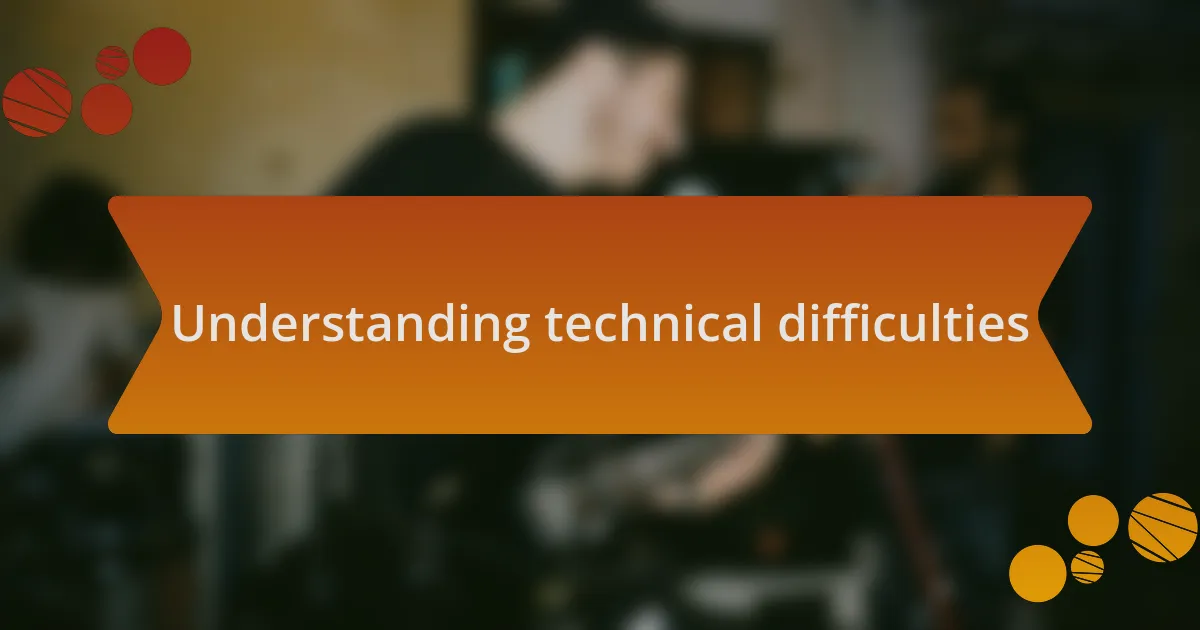
Understanding technical difficulties
Technical difficulties can manifest in numerous ways, often catching us off guard when we least expect it. There was a night when our sound system suddenly dropped out during a peak hour, sparking chaos on the dance floor. Have you ever felt that wave of panic when something essential fails unexpectedly? It’s a moment that tests not just the equipment, but also our ability to maintain composure.
Understanding the root causes of these issues is crucial for any venue manager. I remember struggling for days with internet connectivity issues, which ultimately boiled down to outdated hardware. It made me realize how essential it is to invest in reliable technology and regular maintenance. After all, it’s frustrating to know that a small oversight can lead to a loss of precious moments.
Each glitch presents an opportunity for learning and growth; I often think about the invaluable lessons learned during those stressful episodes. For instance, the importance of having a backup plan became clear when a power outage left us scrambling. Are we as prepared as we could be for unforeseen challenges? It’s a question I constantly revisit, reminding me that preparation is key to turning potential disasters into opportunities for improvement.

Importance of sound quality
Sound quality is the backbone of any nightclub experience. I distinctly remember a night when the bass was so crisp that it sent vibrations through the crowd, enhancing the energy in the room. It made me realize how vital it is to ensure that every beat resonates perfectly. Have you ever had that moment where the music just hits you, and you can’t help but move? That’s the magic of great sound.
In my experience, poor sound quality can drastically alter the atmosphere. I recall a party where the treble was too sharp, creating an uncomfortable buzz that drove patrons out earlier than expected. It struck me then how sound affects not just enjoyment but also the very vibe of the venue. Could it be that a sound check, which seems mundane, is actually the secret sauce for a night to remember?
Moreover, the emotional response to music is heightened by excellent sound clarity. I once watched a DJ weave a narrative through tracks that flowed seamlessly, wrapping us all in a shared moment of euphoria. It dawned on me that investing in sound quality isn’t just about equipment; it’s about crafting unforgettable experiences. So, I often ask myself, how can we create those transformative moments if we overlook the importance of sound?
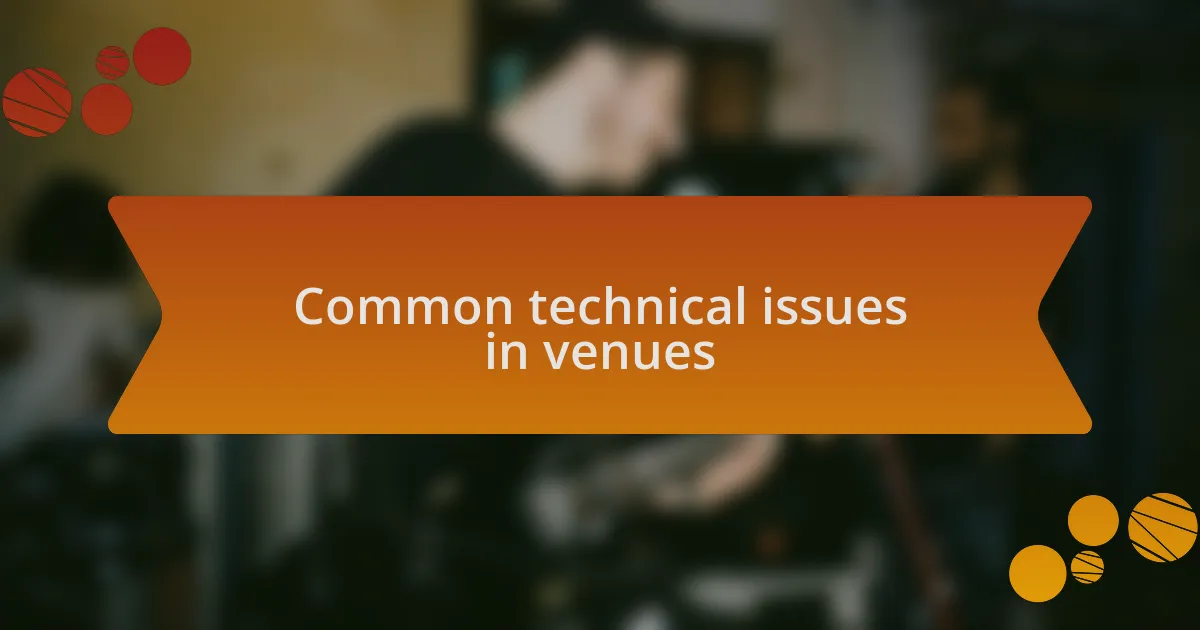
Common technical issues in venues
When running a nightclub, one of the most common technical issues I’ve encountered is unexpected equipment failure. I remember one night when the DJ’s mixer suddenly went silent, leaving the dance floor in a stunned silence. It was one of those moments that makes you realize how fragile a live event can be. Have you ever been caught off guard like that? The tension in the room was palpable, and it took some quick thinking to make a smooth transition while we resolved the problem.
Another frequent challenge is lighting glitches. I’ve been in situations where the lights just blinked out mid-performance, plunging everything into darkness. The stunned faces around me were a mix of confusion and disappointment, reminding me how crucial lighting is to the overall atmosphere. When the lights eventually came back on, I saw a sense of relief wash over the crowd, but it also made me think: how prepared are we for such unexpected issues?
Networking problems, especially with Wi-Fi or sound system integration, can also derail the experience. I specifically remember a night when the Wi-Fi cut out, disrupting the live streaming of a set that patrons were eagerly anticipating. The frustration was evident, and I could feel the excitement draining from the venue. It highlighted for me that investing in reliable technology isn’t just a perk; it’s essential to keeping the vibe alive. How can we expect patrons to enjoy the night if constant connectivity isn’t guaranteed?
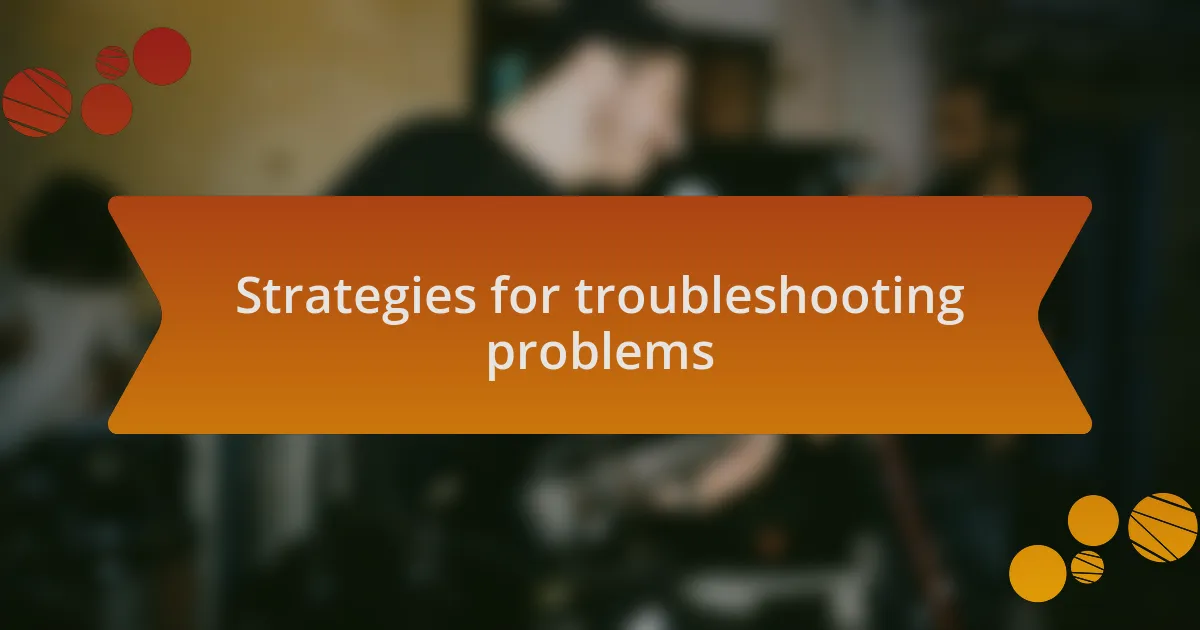
Strategies for troubleshooting problems
Identifying the root cause of the issue quickly is one of the most important strategies for troubleshooting. I recall a night when the DJ’s laptop crashed mid-set, and instead of panicking, I took a breath and assessed the situation. Was it the software, the hardware, or perhaps an external factor? By isolating the problem, I could guide the DJ to a backup plan seamlessly without losing momentum on the dance floor.
Having a reliable backup system in place has saved my organization from complete chaos on several occasions. I once experienced an audio failure during a packed weekend event. Thankfully, we had spare cables and a secondary mixer ready to go. Within minutes, the music was back, and the crowd was as energetic as ever. A backup system isn’t just a safety net; it’s a confidence booster for both staff and patrons.
Training staff on basic troubleshooting is another critical strategy. I remember hosting a workshop where I shared my experiences with technical disruptions, encouraging the team to think critically and act swiftly. Empowering your staff to handle small glitches can make a significant difference. Have you ever had to rely on a member of your team to save the day? It’s these quick, informed actions that can turn potential fiascos into just another story for the after-party.
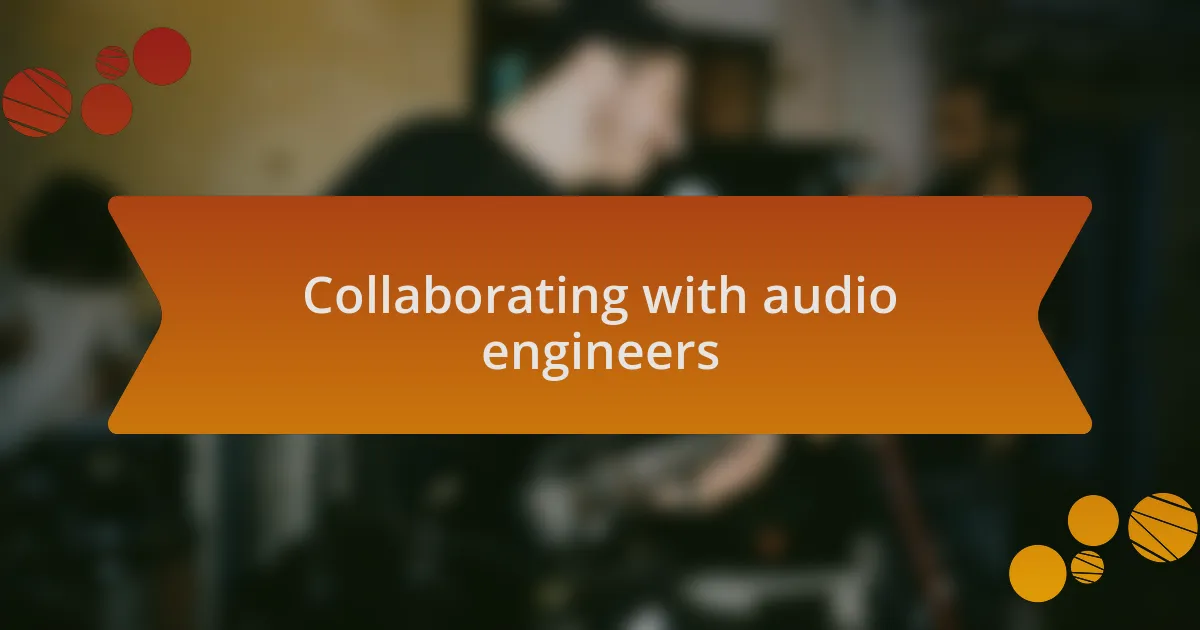
Collaborating with audio engineers
When it comes to collaborating with audio engineers, I find it essential to establish open communication from the get-go. I vividly recall a night when I was setting up for a big show and the head audio engineer was frustrated with the venue’s sound system. Instead of letting tension build, I took the time to discuss their concerns over a quick coffee. That simple chat not only cleared the air but also helped us align our goals for the night. How often do you consider the power of a conversation in resolving technical issues?
Understanding the specific technical needs of the audio team can make all the difference. There was this one time when a sound engineer asked for a unique microphone placement, something I hadn’t considered before. By trusting their expertise, we achieved an incredible sound balance that elevated the entire performance. Trusting the skills of audio engineers allows us to create an experience that resonates with the crowd—how can we afford not to tap into their knowledge?
It’s crucial to keep the engineer in the loop during performances. I remember a particularly intense set when I noticed the engineer adjusting levels dynamically while the DJ was mixing. Watching them work seamlessly together reminded me that collaboration is not just about technical know-how; it’s about creating an atmosphere where creativity can thrive. Have you experienced that magical moment when everything just clicks? That’s the result of a well-synchronized relationship with the audio team.
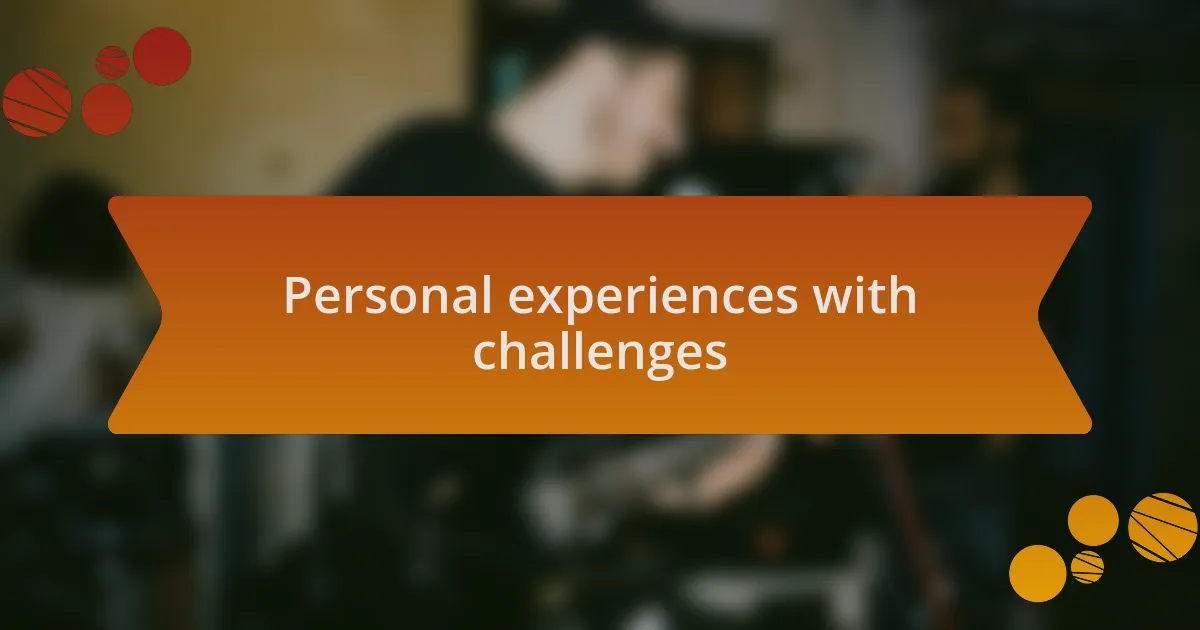
Personal experiences with challenges
Technical difficulties can feel daunting, but I remember a night when an unexpected power surge threatened to shut down our system just moments before a show. My heart raced as I navigated the panic backstage, connecting with the team to redirect power and ensure our backup generators were ready. That experience taught me the importance of preparation and staying calm under pressure; it’s amazing what a well-thought-out backup plan can do.
Another challenge I faced was a last-minute request from a performing artist for a custom lighting setup that our equipment hadn’t been configured for. I can still feel the adrenaline as I dove into my toolkit, improvising a solution on the fly. In that moment, I realized that adaptability is crucial; often, the best fixes come from thinking on your feet. Have you ever found yourself in a situation where you had to rely on your instincts to turn a crisis into an opportunity?
One particular event stands out when the venue’s Wi-Fi dropped unexpectedly during a live streaming session. I was feeling overwhelmed, knowing that hundreds were waiting to tune in online. Jumping into action, I quickly communicated with our tech team to switch to a mobile hotspot, and thankfully, we got the stream back online just in time. That night reinforced the lesson that even in the face of technical chaos, a proactive mindset can often lead to surprising solutions. How do you handle stress when things don’t go as planned?
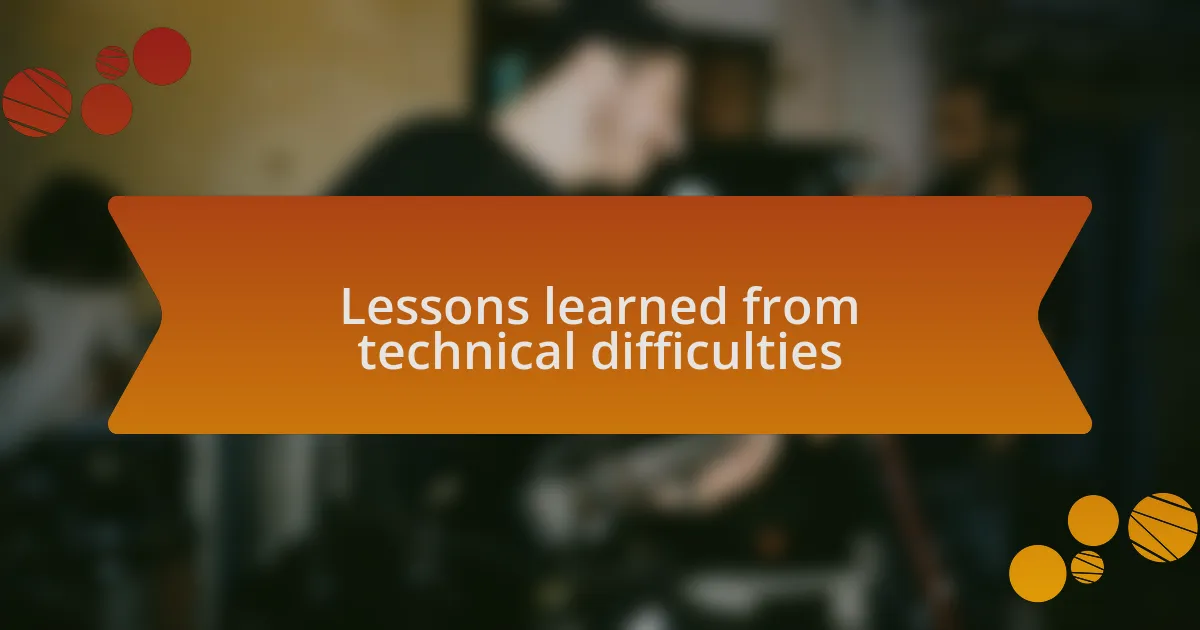
Lessons learned from technical difficulties
When it comes to technical difficulties, one key lesson I’ve learned is the value of thorough testing before any event. I still recall an instance where the sound system encountered feedback issues during a high-energy DJ set. I had underestimating the importance of pre-event checks; I was left scrambling to rectify the issue mid-performance. That experience underscored the necessity of thorough preparation—never assume everything will just work out; double-checking can save the day.
Something that frequently surprised me was how collaboration plays a pivotal role in overcoming tech hiccups. During one particular night, our visual effects software crashed right as a major show was about to start. The energy backstage was tense, and I remember just leaning into my team’s expertise, trusting their skills to troubleshoot. By pooling our resources and communicating effectively, we were able to get everything back online. It taught me that teamwork can turn a frustrating situation into a triumph and that support from colleagues can lead to innovative solutions.
I also found that maintaining an optimistic attitude can dramatically shift the atmosphere during a technical crisis. There was a night when our stage lights failed spectacularly in the middle of a performance, plunging the venue into darkness. Rather than letting panic take over, I decided to embrace the moment, engaging the audience with a lighthearted joke. The laughter that followed helped diffuse the tension and reminded me that sometimes, your response can turn a mishap into a memorable experience. Have you ever discovered that humor can bridge the gap when technology lets you down?